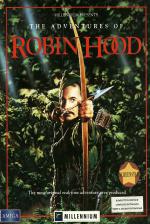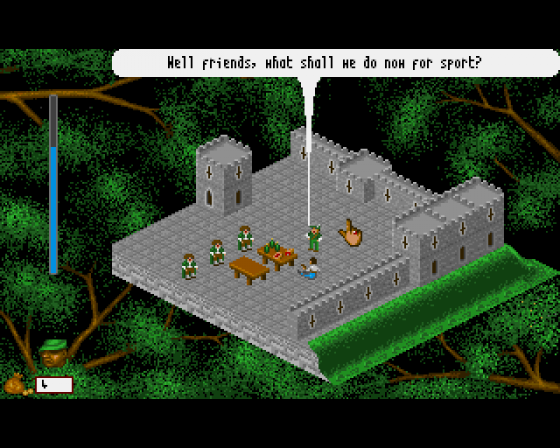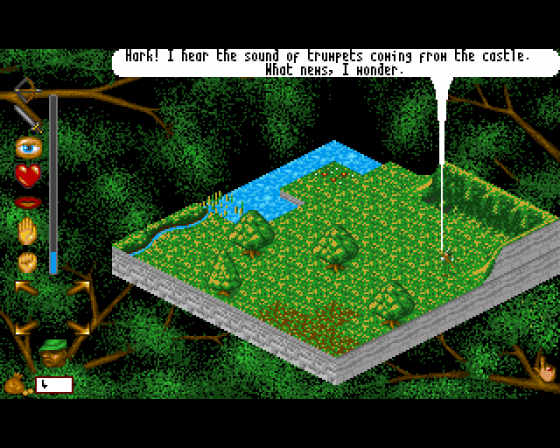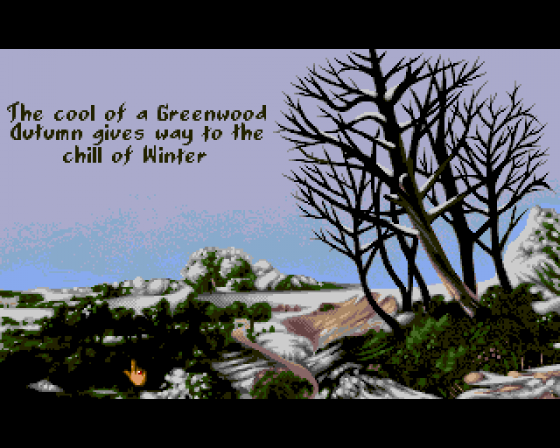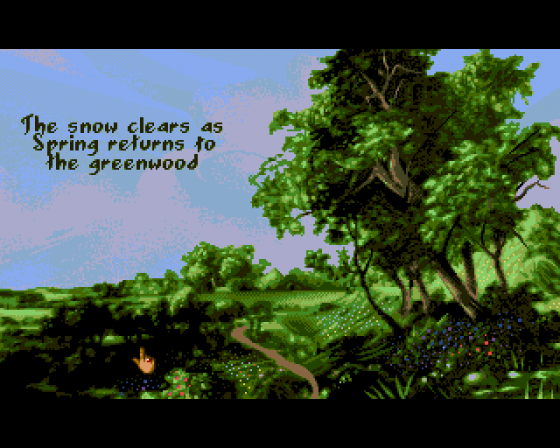
Amiga Power
 1st October 1991
1st October 1991
Categories: Review: Software
Author: Colin Campbell
Publisher: Millennium
Machine: Amiga 500
Published in Amiga Power #6
We've had both the American and British movies, the No. 1 song, and even a TV ad. Now (at last) it's the turn of the Amiga
The Adventures Of Robin Hood
In computer games, as in movies, there seem to be two main ways to portray Robin Hood. You can go for the strong, sensitive and square-jawed approach - as Kevin Costner did (more or less) in the recent movie - or you can go absolutely mad and camp the whole thing up outrageously. Millennium have taken the second route with this game, and, happily, it works a treat. Here Robin Hood is a bimbling idiot, wandering around telling everybody he's depressed, wearing unfeasibly tight tights, and spending most of his time chasing after his allegedly merry men...
Robin Hood (the game) works in a 3D isometric view - not unlike most of these god sim things, in fact - which scrolls around a fair section of merry olde England, including Nottingham Castle, a good dollop of Sherwood Forest and, erm, some fields. An eight by eight square, it's populated by some forty characters, each of whom has his or her own distinct personality (although none are especially complex, it has to be said) - the Normans are brutal and thick, the peasants are fickle and thick, and the merry men tend to be loyal and, well, thick.
The merry men are all there - and all good value entertainment wise - as is the delectable Maid Marian, the poisonous sheriff, and all your favourite supporting characters, as well as (for no easily justifiable reason) a fire-breathing dragon.
Once Upon A Deep Dark Forest

The plot begins with our dispossessed hero dumped on the doorstep of his castle by the wicked sheriff. Since the Robin Hood story has been drummed into most of us since we were about three, it doesn't take much working out to realise roughly what you've got to do - recruit some followers, redistribute the local wealth (using an exciting new scheme called 'daylight robbery'), regain the castle, kill the villains, get hitched to Marian, and, in the course of all this, become even more immensely popular with the locals than you already are. It's all in a day's work for your average medieval champion of the people.
Of course, in order to do any of this you're going to have to be able to move your character around the countryside - your controls are in the form of a column of icons down the left hand side of the screen. By clicking on the lips thingy you can talk to another character (using faintly hilarious comic book style speech bubbles), while clicking on the sword helps you disembowel him, and so on. Character interaction is at the core of this adventure, though your role is fairly passive for the most part; while you can choose who you wish to converse with (of course) the game will take care of the appropriate words.
So, while catching up witm Marian, Robin will deliver a smoochy line of sickening romantic fiddle-faddle ("The sight of a pretty maiden does lift my heart greatly" or something similar), while, when grappling with Normans, Robin will start shouting fave medieval put-downs of the "Got you, varlet" variety. Hardcore adventurers may well find this a bit restrictive and really rather silly, but then, this isn't a hardcore adventure and was never meant to be. While not as witty or well thought out as the speech in, say, Monkey Island, the effect is lightweight, entertaining and really quite jolly, serving the purposes of the gameplay admirably.

So how do you progress? Well, mostly by simply being in the right place to take part in the right event - or talk to the right person - at the right time. Doing things in the correct order is all-important - for example, terminating the sheriff before you've won over Marian and the locals is a stupid move, while saving Will Scarlet from the hangman's noose is a smart one. Screw up and you'll either die or see your popularity ratings - you have various energy bars you've got to juggle with throughout the game - take a nasty dive. You know things are going well when certain characters present you with (immensely useful) gifts in return for doing them some favour. You'll have to find out how to win these treasures (seven in all) yourself, but suffice to say, some are more easily attainable than others.
Impressively, Millennium have gone to some trouble to ensure that events seem to be taking place in a believable medieval world. While you spend your time walking around, meeting new people, slaying wicked Normans, and robbing fatcat merchants, all around you get the sense of a thriving community full of people happily getting on with their lives. Oblivious to your struggles, peasants will be tilling the land, while Norman soldiers go about their gormless patrols (a task to which they seem well suited).
All Is Not Well In The Forest
If this all sounds peachy then, yes it is - to a point. Unfortunately, the game has a number of problems that you'll stumble across almost immediately. For a start, everyone is small to the extent of being Very Very Small indeed. So small, in fact, that it's sometimes hard to see just who is who. This isn't always too much of a disaster, but it does niggle.
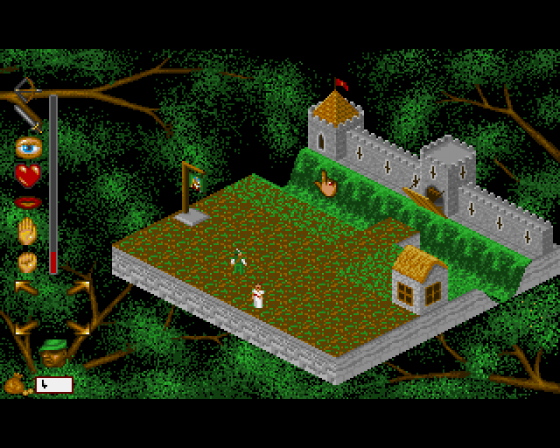
Another problem is with the sequencing of events. If you save somebody's life and get caught by the Normans in the process, your pal will still be singing praises of your bravery while you are swinging from the gallows. Clearly, events overlapping often create absurb situations, which can be irritating - though, to be honest, most of the time they merely add to the camp appeal of the game.
In fact, the whole thing is packed with little mistakes or quirks which by rights should be annoying - but aren't. The inhabitants of Nottinghamshire can't seem to work out if they should speak in classic Olde English, 20th Century Californian, or even BBC English circa 1935, for instance. You get phrases which have only been in currency for twenty years ("Hey dude") jammed next to words which only a genuine Anglo Saxon could get away with ("methinks", say), creating an odd effect that sometimes seems deliberate, sometimes accidental, and sometimes just a little bit crap. Still, if Kevin Costner can get away with it in Prince Of Thieves, I suppose millennium can too...
In fact, the most surprising thing is just how much this game manages to get away with. Things which would annoy immensely elsewhere instead prove to be merely slightly irritating here - or sometimes even less than that, coming across as more a charming little idiosyncrasy than a fault at all.
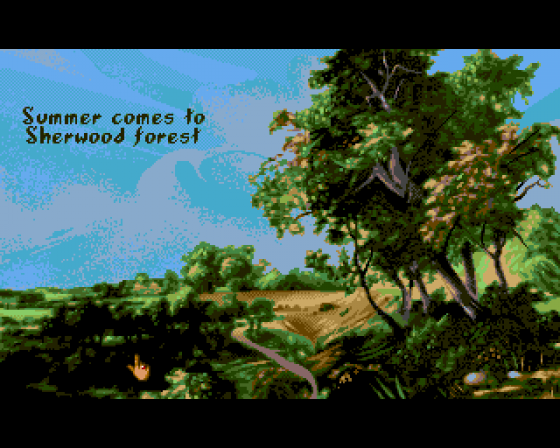
There are a good thirty or so hours of gameplay here, but even if you finish the game quickly there's enough to be seen and done to make simply exploring it a pleasure on its own. This is one of those 'blanket' adventures that you really immerse yourself in, rather than a linear problem solver, and as far as I'm concerned that's all to the good. I'm no great adventure player, but here is a game I've really enjoyed, and I dare say that anyone would.
While it's not as challenging or original or funny as, say, Mega Lo Mania, this is a worthy outing for England's most famous hero, executed with sufficient wit to make it one of the autumn's more noteworthy releases.
The Bottom Line
Uppers: Witty and lightweight adventure with plenty of swashbuckling, character interaction and that genuine Sherwood Forest feel (whatever that is).
Downers: Not nearly as well executed as many contemporaries; the size of on-screen characters can get annoying.
An adventure in the true sense of the word. Fun, exciting, challenging, and there are a few laughs to be had. That said, there are enough glaring imperfections to keep it firmly outside the classic bracket.
Other Amiga 500 Game Reviews By Colin Campbell
This article was converted to a web page from the following pages of Amiga Power #6.

